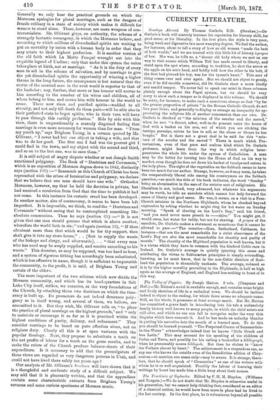CURRENT LITERATURE.
Sundays Abroad. By Thomas Guthrie, D.D. (Strahan.)—Dr Guthrie's book will scarcely increase his reputation for literary skill, for good sense, or for liberality. In the first place, the style is very poor, being weak and digressive to a most wearying degree. We find the author, for instance, about to tell a story of how an old woman "made the best of both worlds," and we are treated with this little bit of history hpropos of her. She was, he tolls us, a "decent old body whom we met on our way to visit scenes which William Tell has made sacred to liberty, and stand upon the spot where, according to tradition, he shot the arrow at the apple on his son's head, and boldly told how the other in his belt, if the first had pierced his boy, was for the tyrant's heart." This sort of thing comes over and over again. But we should not object to gossip, even if he did ramble somewhat, did Dr. Guthrie show a more kindly and candid temper. Wo never fail to speak our mind in these columns plainly enough about the Papal system, but we should be very sorry to show such a temper as is displayed in this volume. We should be sorry, for instance, to make such a monstrous charge as that "by far the greater proportion of priests " in the Roman Catholic Church do not live pure lives; and generally to display so strange an incapacity for ap- preciating the religious life of another cotnumnion than our own. Dr. Guthrie is shocked at "the mixture of the secular and the sacred," when he sees "a decent, sober, well-to-do peasant enter the house of God with a basket on his arm, out of which you see sticking the turnips, parsnips, onions he has to sell, or the shoes or blouse he has bought." But is there not a great deal to be said for this "mix- ture of the secular and the sacred "? There is much which Pro- testantism, even of that pure and zealous kind which Dr. Guthrie professes, might learn from the way in which religion inter- penetrates the whole life under the system of Catholicism. A man may be the better for turning into the House of God on his way to market, even though he does set down his basket of turnips and onions in the holy place. The sight of the vegetables on the Sabbath seems to have been too mach for our author. Strange, however, as it may seem, he takes the comparatively liberal side among his countrymen on the Sabbath question,—so much the title of his book indicates, the word " Sunday " being an abomination in the ears of the stricter sort of religionists. His liberalism is not, indeed, very advanced, but whatever his arguments may be worth, he tells an anecdote which cannot but help forward the cause of liberty and good sense. He was, it seems, on a visit to a Free- Church minister in the Northern Highlands, whom he shocked beyond expression by asking whether he might ring for hot water on Sunday morning. "Speak of shaving on the Lord's Day," said his friend, "and you need never more preach in —shire." You might get, it would seem, hot water for toddy, but not for shaving. A propos of the anecdote, Dr. Guthrie makes a statement so monstrous that it cannot be allowed to pass :—" The counties—Ross, Sutherland, Caithness, for instance—that are the most remarkable for a strict observance of the Lord's Day are also the most remarkable for chastity and purity of morals." The chastity of the Highland population is well known, but it is a virtue which they have in common with the kindred Celtic race in Ireland. Dr. Guthrie's courage in quietly ignoring this cause and attributing the virtue to Sabbatarian principles- is simply astounding, knowing, as he roust know, that in the non-Celtic districts of Scot- land the population is shamefully unchaste. The average, reduced as it is by the higher morality prevailing in the Highlands, is half as high again as the average of England, and England has nothing to boast of in this way.


































 Previous page
Previous page